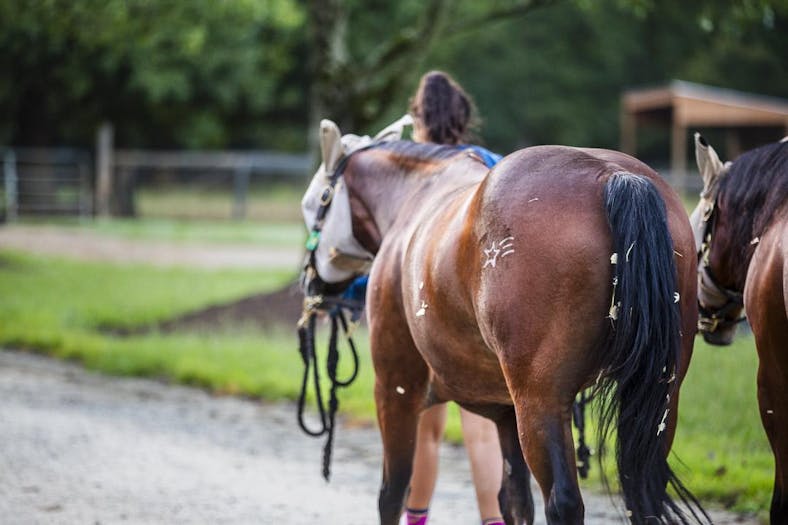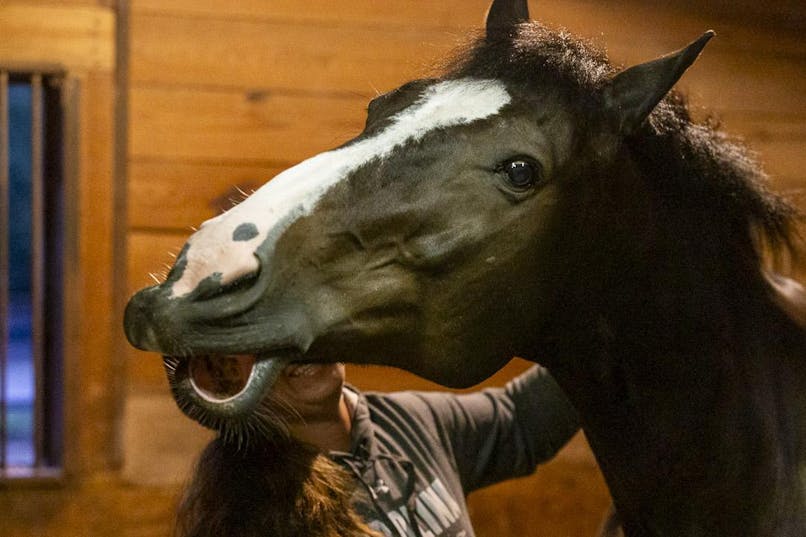A typical early-morning shift for South Carolina equestrian's barn manager, Maggie Barton, starts around 6 a.m.
Barton begins her day at One Wood Farm by giving the horses hay and water, cleaning their stalls and re-adjusting their bedding. She then takes them to the horse walker, a treadmill-like device with pre-set walking, trotting and jogging routines, to warm up the horses’ muscles.
Around lunchtime, Barton and her staff work on facility-related projects, such as checking and repairing fences, and providing therapeutic treatments. The horses continue practicing throughout the day until late in the afternoon when they are fed again. While their stalls are cleaned, they venture outside one final time before falling asleep.
Even though the days are long, Barton said each task is integral to keeping the horses and the Gamecock equestrian team performing to the best of their abilities.
“Without them, we wouldn’t be able to compete," Barton said. "We owe it all to them, and owe it to them to give them the best of what we can do to keep them healthy and happy.”
Barton said her strategy for helping the horses stay healthy begins with food, which gives them the protein and energy necessary to perform at a high level. Hydration is equally important to the horses’ well-being, especially in a state like South Carolina, where temperatures can reach triple digits during the summer. Barton said she always makes sure to have plenty of water around the farm and even gives the horses electrolyte-enhanced feed to ensure that they stay hydrated.

Senior stable hand Lydia Correa (center) leads Sparkle-Doodle-Doo, better known as "Sparky," (left) and Barnaby (right) to a pen to graze. The barn staff takes the horses out every morning to exercise prior to their training.
Barton also ensures that the horses at One Wood Farm are given ample opportunities for turnout, which is when horses spend time outside of their stables, roaming around and interacting with other horses.
“Say, (if) soccer players or football (players) play that day, they probably get out the next day and just move around," Barton said. "It’s better for them to not just sit and do nothing, so we thrive on that and so do they.”
However, Barton and her staff are not alone in taking care of the horses on the farm. At the beginning of the season, each rider chooses a “care horse” to tend to throughout the season by performing a number of health-related tasks.
“We would get there about an hour before our practice, make sure they’re super cleaned up, wrap them, put their boots on,” senior Emilia Reutimann said. “On meet day, they have to be bathed, a lot of times banded, make sure their manes and tails are the right length.”
While general treatments apply to every horse on the farm, additional attention may be needed depending on each horse’s current health status.
Horses overcoming physical injuries are closely monitored throughout their recovery process as they gradually increase in movement from stall rest to walking, jogging, loping and jumping. At different steps along their recovery journeys, horses can be prescribed any number of treatments, including a massage gun, Bemer Blanket, which uses electromagnetic pulses to increase blood circulation, or TheraPlate, a vibrating platform that performs different muscle exercises.
Reutimann and other riders help Barton and her staff with administering these medical treatments along with liniment baths, which help sooth a horses' muscles if it feels sore after a practice session.
To keep the horses healthy, Barton said she consults with veterinarians and farriers weekly to ensure that everything is going according to schedule.
“We have to have it down to a science and make sure that everybody’s on the same page as to what needs to be done at what specific times,” Barton said. “It’s so important that they get the right amount of treatment and the right time frame that they need to be doing (it).”
Head coach Boo Major said there are few collegiate equestrian teams that take care of their horses both medically and hygienically better than South Carolina’s.
“I will say, I think our horses are the best-looking horses, period. Not only in the SEC, but I think in all of the NCEA,” Major said. “We really pride ourselves in how we take care of them.”
Beyond basic care, riders on the equestrian team also provide horses with companionship, which allows both the horse and the rider to develop a close bond with one another according to Reutimann.
“Once you get to college riding, it takes a lot of adaptability,” Reutimann said. “You have to be able to feel out a horse really quickly and make them trust you quickly, so it’s a lot of paying attention to how they react to certain things because every horse is different, just like every person is different personality-wise.”

Barn Manager Maggie Barton pets Barnaby during her morning rounds at One Wood Farm on Sept. 1, 2023. Barton has been working at One Wood Farm for 10 seasons, overseeing the barn staff, taking care of the facilities and maintaining the health and well-being of the horses.
Unfortunately, Gamecock riders don't have the luxury of working with horses from One Wood Farm for every meet, so their abilities to adapt are put to the test during competitions on the road, where they have only four minutes to prepare with horses from their opponents’ farm before the show.
“In that four minutes, they have to figure out what they can fix, what’s good, and also what they’ll have to take. If they can’t get a horse to do something in particular, then they just figure out a way to pretend like it’s happening,” Major said. “That is the real talent of collegiate riding is what we call ‘catch riding,’ and it’s your ability to figure a horse out quickly and then be able to get on it and perform.”
According to Reutimann, observing the opposing team’s warmups is key to developing chemistry with unfamiliar horses as quickly as possible.
“There’s some horses where, if you use a lot of leg on them or you’re in them with your hand a lot, they get a little bit annoyed, as compared to — there’s other horses where it doesn’t bother them, and you can train on them a little bit easier,” Reutimann said. “So just observing, like I said before, reading their emotions (and) observing what they seem to respond well to.”
As the season progresses, Reutimann said she feels “more at home” when forming a relationship with her care horse, as it helps her through difficult stages of her college life.
“All through life, it’s been a huge help for me. It’s just given me something to look forward to, even if there’s something going on in life that might be hard,” Reutimann said. "I think for almost all the girls — but I definitely feel it, too — being able to go to the barn and have that couple-hour block where you’re just out there and you don’t have to think about anything else going on ... I think that’s incredibly beneficial.”
Ultimately, Reutimann said this relationship between the horse and its rider is what separates equestrian from other sports at the University of South Carolina. Athletes playing other sports take care of their equipment, but riders on the equestrian team spend considerable hours tending to living, breathing animals.
“We are not just thinking about ourselves, we are thinking about, ‘What do I need to do for this horse to ride better for me next time?' or 'What do I need to do to get this horse feeling better so we can start using it for practice again?’" Reutimann said. “It's just a whole other aspect that a lot of other athletes don’t necessarily have to worry about.”

